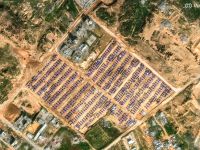An open letter from an Egyptian with an eating disorder
The thing about eating disorders is that it’s an invisible illness and the physical ramifications of that illness only appear after a long period of time of abusing one’s own body. Just like any psychological or mental illness, we shy away from the discussion, leaving many women, men, and children, struggling in the dark, feeling helpless and hopeless.
Continue reading on African Digital Art
The growing phenomenon of Afghan refugees joining Iran’s Revolutionary Guards to support the Syrian Assad regime has sparked increasing attention. In January, Human Rights Watch (HRW) reported that thousands of Afghan refugees in Iran – many of them minors – have been coerced into fighting in Syria, and several of them threatened with deportation if they refused.
The Iranian authorities told the refugees that if they defected, their families would be detained. According to HRW and Al Jazeera, Iranian officials have also recruited Afghan refugee detainees, offering to reduce or remove their prison sentences in return for army service. These Afghans are promised up to $1,000 in monthly salary and legal residence upon return to Iran. However, few of the fighters that HRW interviewed had received these benefits.
Continue reading on Ajam Media Collective







